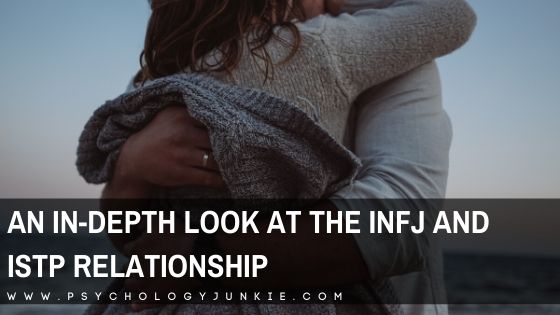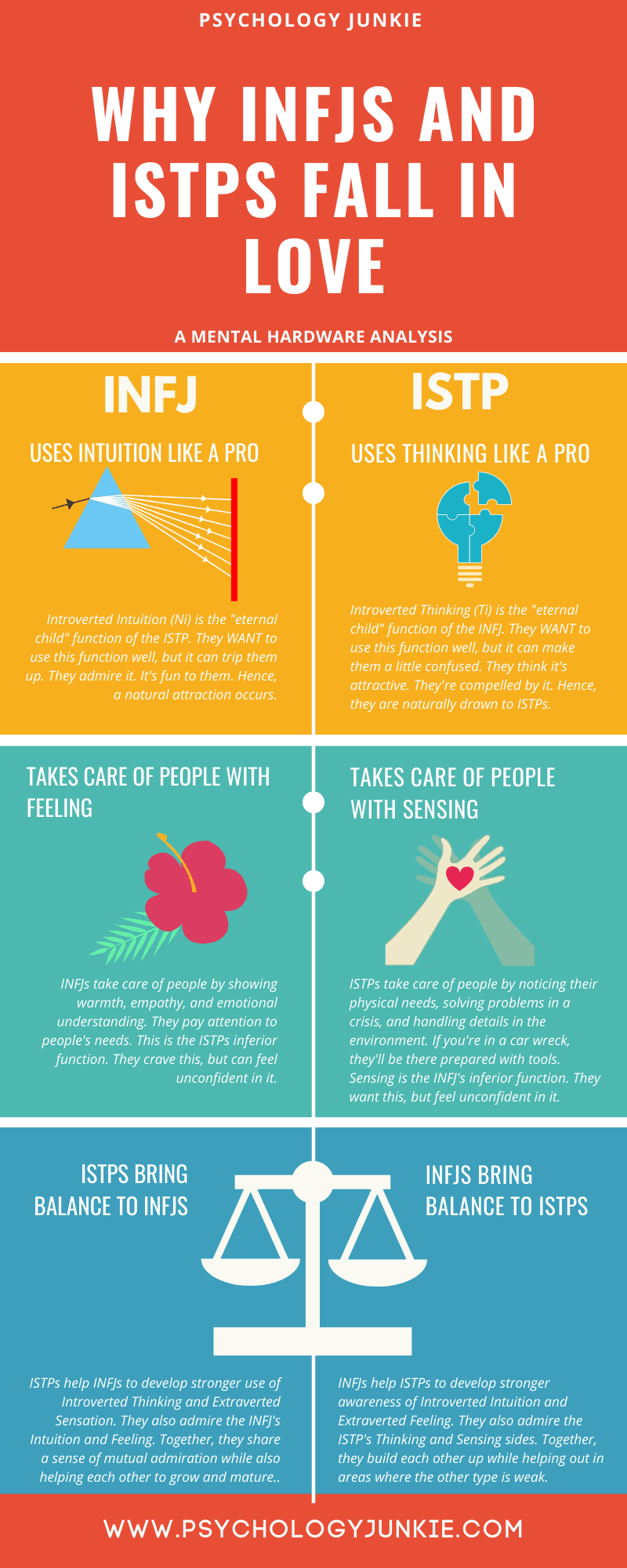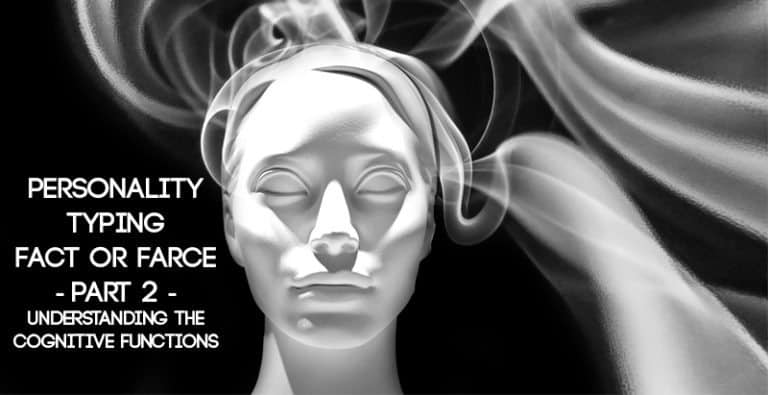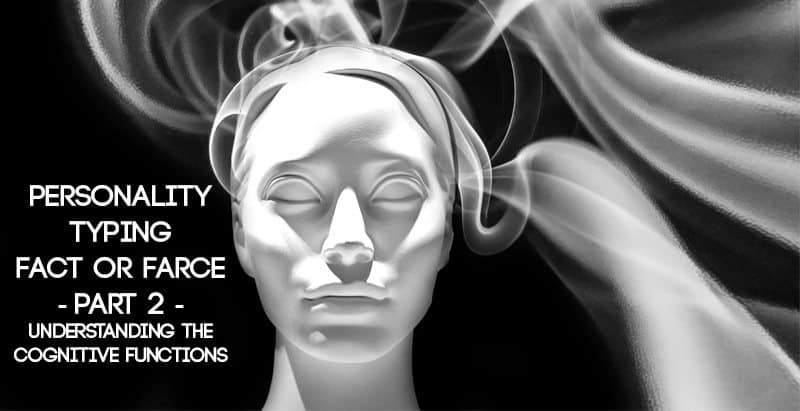An In-Depth Look at the INFJ and ISTP Relationship
The INFJ and ISTP relationship is one that I’ve seen dozens of times as an MBTI® practitioner. Why do these two types wind up together so often? Well, it all boils down to opposites (sort of) attracting.
Let’s take a look at the mental processes of the INFJ and the ISTP:

The INFJ and ISTP Relationship – How Their Mind’s Make Them Attracted to Each Other
INFJ Cognitive Functions:
Dominant function: Introverted Intuition (Ni)
– This is the “powerhouse” function that INFJs use most easily and readily. It gets them in flow, makes them feel good, and is the process they’re most confident using. Ni focuses on seeing hidden trends, patterns, symbols, and future potential.
Auxiliary function: Extraverted Feeling (Fe)
– This function works as support and back-up for Ni. Fe is what INFJs show to the world around them – it’s the “warm” side of the INFJ. It’s the side that brings cookies to a friend’s house, makes self-deprecating jokes so that people feel comfortable, and makes the appropriate “Awww,” face when someone is telling a sad story.
Tertiary function: Introverted Thinking (Ti)
– This function is how INFJs get playful and have fun. It’s the analytical, truth-seeking side of the INFJ. They can falter here sometimes, but they enjoy it anyway.
Inferior function: Extraverted Sensation (Se)
– This function is the INFJ’s Achilles’ heel. They trip up here a lot, but they REALLY want to use it well. It’s the thing they always imagine doing well but feels forever out of their grasp. Se is all about being responsive to the environment, staying present, and paying attention to concrete details.
Now let’s look at the ISTP’s Cognitive Functions
Dominant function: Introverted Thinking (Ti)
– This is the function that ISTPs use the most easily. It gets them in flow, makes them feel happy, and is a source of confidence. Ti is all about finding logical relationships, seeking logical consistency, and developing a “mind-map” of how the world and everything in it works.
Auxiliary function: Extraverted Sensation (Se)
– This function acts as back-up for Ti. This is the process that will be the most obvious with ISTPs. It’s what makes them so observant, tuned into what’s happening around them, and responsive to changes in their environment.
Tertiary function: Introverted Intuition (Ni)
– This is how ISTPs get playful and creative. This is the side of them that notices symbolism and looks for hidden meanings. It’s kind of an “Inner Yoda.” They want to use this function well, but can falter at times.
Inferior function: Extraverted Feeling (Fe)
– This is the ISTP’s Achilles’ heel. They tend to have a love-hate relationship with this function because while they wish they could harness its power, they also tend to feel like it’s way less important than their other functions. Fe is all about being responsive to people and their emotions. It’s about understanding group dynamics and setting the emotional “tone.”
So why do INFJs and ISTPs Fall in Love?
Well, aside from all the very subjective reasons we can’t possibly cover here, a lot of us it comes down to balance. INFJs aspire to use Sensing and Thinking well, but this can feel tenuous and shaky. ISTPs don’t have an issue here. They live in the world of sensation and thinking. They exude a sort of tactical confidence and street-smarts that is sexy and appealing to INFJs.
ISTPs aspire to use Intuition and Feeling well, but it’s hard for them. Trying to get “good” at these functions can feel like trying to juggle eggs on a tilt-a-whirl. INFJs don’t have a problem with these functions. They live in the world of intuition and feeling, so it comes naturally to them. Their warmth, imagination, and insight seem appealing and attractive to the ISTP.
Essentially, INFJs and ISTPs each have the “secret weapon” the other type has wanted all their lives.
5 Benefits to the INFJ and ISTP Relationship:
#1 – ISTPs Help INFJs to Stay Present
INFJs tend to get lost in musing and analysis paralysis on a regular basis. They’re always thinking forward, preparing, and tend to get caught up in worrying too much about what people think. ISTPs help them to slow down, enjoy the moment, and pay attention to simple pleasures that they tend to overlook. In this relationship, it’s usually the ISTP who helps the INFJ to stay present and focused on the beauty of the moment. ISTPs can also help INFJs to deal with details that they might miss (For example, they might be the first to notice that the milk has been left out or the gas is almost empty in the car).
#2 – INFJs Help ISTPs to Look Forward
INFJs are always thinking of the long-game. They notice the timing, trends, patterns, and implications of everything happening around them. When they make decisions, they spend time considering how those decisions will impact the future. INFJs can help ISTPs to consider the long-term ramifications of a decision or direction.
#3 – Both of These Types Respect Each Other’s Space
INFJs and ISTPs are both introverts, and because of that, they need space – even within their relationship. There’s a mutual respect that each type has for the other’s items, space, and time. Neither is likely to push the other into a lot of social engagements they are not ready for. Both will understand when the other needs time to think over a question before responding.
#4 – Both Types Think Before They React
Neither of these types are emotionally reactionary (unless highly stressed), and both value diplomacy when dealing with relationship issues.
#5 – Both Protect Each Other
INFJs are extremely protective of their partner’s feelings and can sense that even though ISTP’s seem reserved and stoic to some, they have deeper feelings about things than people realize. INFJs will go to great lengths to protect that side of the ISTP. In the same sense, ISTPs are protective of the more tangible needs of the INFJ. When the INFJ is dealing with a bully or is stumped by a technical problem, the ISTP will typically go to great lengths to help, support, or defend the INFJ.
3 Potential Struggles in the INFJ and ISTP Relationship:
#1 – Differences In Emotional Expression
ISTPs tend to be reserved about their feelings unless they are stressed, in which case they can be more reactive than usual. INFJs, in contrast, like a lot of emotional transparency and openness. They’ll ask, “How are you feeling?” “What are you thinking about” “Is everything okay?” a lot, and this can annoy ISTPs sometimes. In contrast, the ISTP’s reservedness can annoy the INFJ, who feels confused by their lack of transparency.
#2 – Differences in Planning
INFJs like to have a clear plan and direction for their lives. Leaving things open-ended and unplanned stresses them out. They want to know where things will lead. Because of this, being flexible and spontaneous can make them irritable. ISTPs, in contrast, like to leave their options open until they have as much information as possible. They hate being rushed, and act on their impulses and instincts more than a laid-out plan. Both partners can get frustrated with each other when the other partner won’t conform to their preferred lifestyle. The INFJ thinks that the ISTP is procrastinating for too long and leaving things undecided. The ISTP feels pressured by the INFJ and might think they are being controlling and high-strung for no good reason.
#3 – Difficulties in Decision-Making
When INFJs make decisions, they look at everyone’s feelings and try to imagine how everyone will be impacted emotionally. Maintaining harmony and getting people’s needs met is the priority. They can get caught there, focusing so much on people’s feelings that they forget to look at the cold, hard facts. ISTPs, in contrast, look at the facts, pros and cons, and likely effects when they make a decision. They may get stuck there, and forget to think about the feelings and emotional needs of people involved. What results are arguments where INFJs feel that ISTPs are being too insensitive in their decisions, and ISTPs feel like INFJs are too influenced by their emotions or the emotions of other people and need to face the facts.
What Can You Do?
Learn about each other in order to understand the differences rather than get irritated by them.
ISTPs, know that your partner will want a plan and direction for their lives. As much as possible, give them some kind of closure, even if that means saying, “I need a week to think this over.” Timelines help INFJs a lot.
INFJs, know that your partner will want things flexible and laid-back. They are wired to respond to the moment and their laid-back approach to life means that they can respond readily to whatever might happen. Rather than being married to their plan, they keep themselves ready and open for whatever crisis or opportunity might arise unexpectedly.
ISTPs, try to take at least fifteen minutes during each day to let your partner know where you’re at emotionally. Tell them what you love about them. Give them a hug. Ask them if they want to talk about anything. Put your phone away and listen actively to what they say
INFJs, respect your partner’s decision-making style. Instead of immediately assuming you have the moral high-ground because your decision is lined up with your values, really think about their perspective. Maybe there would be some good in emotionally detaching from the situation before making a decision. Maybe the logical approach is the best one – or maybe there’s a compromise.
Here are some articles you can read to get a better understanding of each other:
What It Means to be an INFJ Personality Type
ISTP In-Depth Personality Profile
What Are Your Thoughts?
Do you have any insight or experience to add? Let us know in the comments!
Find out more about your personality type in our eBook, Discovering You: Unlocking the Power of Personality Type.















Great post!! It perfectly captures and my ISTP partner 🙂
Thank you so much for covering this. I’ve been so curious about how my boyfriend and I (our types) relate to one another. This has been very helpful 🙂
Wow! Great insight and helpful hints. I’m an ISTP and my wife is an ENFJ which seems to nail her except the introverted vs extroverted mismatch. Thank you
Very very insightful and rings true for me (INFJ) and my partner (ISTP) and where our stumbling blocks are. Thank you!
Stupidity. You are talking about codependency and not live. INFJs are not codependent anyway. You should stop writing about MBTI.
INFJ here. I think about it more along the perspective of both partners giving 100% of themselves, and it happens that each type can contribute a lot more in the areas the other is lacking. They are successful on their own, and made better by the addition of a partner who helps them see things differently and can provide those things. A symbiotic relationship if I remember correctly.
I’m an INFJ and I definitely am not codepend. My husband is an ISTP. I would love to have a more unified marriage and have talked to my husband about many of the things mentioned in this article prior to even reading this article. You sound as though someone has hurt you deeply and your defenses is on high. I am sorry for that. To the author, this is a wonderful and helpful article.
Loved reading this !
I’m an INFJ & I’ve realised my partner is an ISTP- something he will probably have no interest in learning, but it’s helped me to understand the minor discrepancies of recent given our personality differences.
Thank you. I am an INFJ and my husband is ISTP. This cleared a lot for me.